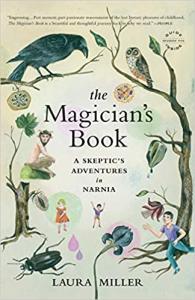
For over 60 years The Chronicles of Narnia have been beloved children’s stories. However, when Laura Miller discovered their Christian symbolism as a teenage skeptic she felt duped. Years later, she says she’s rediscovered the beauty of Narnia. Could we be missing the apologetic power of telling stories?
Modern debates about the existence of God tend to focus on reason, science, and logic. We find lecture halls packed with believers and unbelievers awaiting scholarly fireworks shows. Such events may briefly breathe new life into the deeply held presuppositions of the combatants, but in the end most onlookers will continue to inhale the same worldview air, living with or without God.
Is there another way? What if our discussions with our atheist friends occurred in the fiction section rather than the philosophy section of the library? Is there apologetic value in Christian fantasy literature? Can a skeptic really feel at home in Narnia?
The recent replay of the classic Unbelievable? episode – A Skeptic in Narnia – addressed this very topic with atheist Laura Miller and believer Michael Ward.
Laura had been introduced to the Chronicles of Narnia at the age of seven by a second-grade teacher who gave her a copy of The Lion, the Witch and the Wardrobe. The Chronicles not only transformed Laura’s childhood but also set the trajectory for her adult vocation as a literary critic. As a child, the books opened up, “a world fresher, more brightly coloured, more exhilarating, more fully felt than my own.”
Duped by CS Lewis?
That world, however, came crashing down upon her at the age of thirteen when it was pointed out to her that the books contained Christian imagery. Laura had been quite content being a citizen of Narnia until the Church barged in to take a census of all the Christians. She was disappointed that her beloved fantasy land was actually a Christian home for wayward children where all the toys were child-proofed and the adventures scripted.
My relationship to Narnia would turn out to be as rocky as any love affair, a story of enchantment, betrayal, estrangement, and reunion. A few years after the day I’m remembering, when I discovered some of the more obvious “secret” meanings in C. S. Lewis’s children’s books, I felt tricked, and for a long time I avoided even thinking about Narnia.
Her discovery caused her to avoid Narnia for many years because she felt like she had been duped. She hesitantly revisited Narnia as an adult when she was asked to write about the books that had most influenced her life. Despite her rocky relationship with The Chronicles, she had to admit that they had been pivotal in establishing her love for literature.
 Out of this assignment came her book, The Magician’s Book: A Skeptic’s Adventures in Narnia. A thoroughly enjoyable read that is well written and thought-provoking. It is part autobiography, part literary criticism, and part speculative psychology. While I took issue with some of the conclusions she made in her book, I found that she was circumspect and humble in all that she asserted.
Out of this assignment came her book, The Magician’s Book: A Skeptic’s Adventures in Narnia. A thoroughly enjoyable read that is well written and thought-provoking. It is part autobiography, part literary criticism, and part speculative psychology. While I took issue with some of the conclusions she made in her book, I found that she was circumspect and humble in all that she asserted.
Laura goes into more detail in her book as to why the discovery of Christian symbolism so severely rocked her world.
As soon as I acquired any independence of thought, I drifted away from the Church and what I saw as its endless proscriptions and requirements, its guilt-mongering and tedious rituals. So I was horrified to discover that the Chronicles of Narnia, the joy of my childhood and the cornerstone of my imaginative life, were really just the doctrines of the Church in disguise.
Growing up with Narnia
Michael Ward, the Christian guest on the show, is a leading CS Lewis scholar who has discovered a striking hidden theme in the Narnia stories. Growing up with Narnia, he had an opposite response to the Christian imagery. Rather than tainting Narnia, he felt that the symbolism actually gave it more depth and richness.
One of the fascinating aspects of the discussion was the way in which each guest read the books. Laura read them privately, away from family, in order to protect Narnia from adult intrusion, while Michael and Justin, read the books communally with parents and siblings. C.S. Lewis didn’t simply write the Chronicles as furry gospel allegories for children, he also intended them to be adult meditations on theological issues. It may be that when these books are read communally they are more conducive to deeper exploration because the adventures are shared with both young and old alike.
Justin asked her to explain how her aversion to the church informed the indignation she experienced when she discovered that Narnia was just veiled Christianity.
“I wouldn’t make my early Christian upbringing out to be a terrible mistake, a miscarriage of religious education. I was raised as a Catholic, but not as a particularly strict or gloomy Catholic. My family went to a fairly liberal minded Californian Catholic church and I went to catechism. To me, it felt like a system of rules that often seemed arbitrary and full of peculiar loopholes and contradictions. It never really appealed to my imagination and I never experienced any sort of strong religious feelings. It was just something that I had to do. Once a week, go to church and once a week, go to catechism and it was a dreary obligation than my mother made me do. To me it was actually far less interesting than real school. It was a tedious thing that I was constantly resisting.”
Laura expands on this in her book:
I hated church. I bridled at the ritual of confession and was suspicious of the idea of original sin. Above all, I was bored by all the stories of men in beards and sandals endlessly gabbing on about mustard seeds, fishes, and vineyards… Christianity instructed me to comply with a list of dreary, legalistic demands because Jesus, whom I had never met, reportedly loved me and had redeemed me from the guilt of a sin I had never committed by dying before I was even born.
Narnia’s appeal
Laura, however, was drawn into these books before she knew about their Christian references so there had to have been something about the stories that resonated with her. Michael asked her what it was that attracted her to Narnia if it wasn’t the Christian allusions?
“What spoke to me in those books was the whole body of Western culture, which is something that I really, really love, even if I don’t actually believe in its God. Lewis was sort of able to muster all of these elements, including all of the incredibly rich cultural imagery…into this seemingly really simple fairy tale narrative. I was responding to things like the fauns and centaurs which were one of the best things about these books, which obviously don’t have anything to do with Judeo-Christian religion. They’re a classical myth. But that was my first introduction to classical mythology. And that just blew my mind. I loved that so much and that led me on this path to discovering Western culture. And I think that the values that Lewis was espousing in the Narnia books were, for the most part… values of being part of the group, of humility, of perseverance, of sacrifice, that sort of thing.”
During the interview, and in her book, she doesn’t give a very thoughtful critique of Christianity but just falls back on her dislike of the rules and rituals of the church. The main reason she gave for not being convinced by the Christian themes in The Chronicles of Narnia was that she felt that she just wasn’t wired for religion. She describes Lewis’ conversion as somewhat inevitable in contrast to her own experience.
“I don’t think I ever really was a believer, I didn’t have the Constitution of a believer, and while I can look at Narnia now and see many fine things about Christianity and say this is a good value or a lovely idea, I don’t really believe in God and that’s the rub. I mean maybe it would be nice if it was true, although I have to admit that I’ve never been particularly tempted to believe that it was true the way that Lewis believed it was. I think my childhood experience was kind of like Lewis’ in that he was sort of put off by the church because it didn’t appeal to his imagination… but I think that part of him always longed to believe. He found a way to reconcile the fact that his aesthetics were with these pagan mythologies… He often spoke of things that he read about in books as if they were real things in the world. He eventually found a way to reconcile that with the Christian faith and Tolkien was very helpful for him in that.”
Magic or Sleight-of-Hand?
It was with the help of his friends, J.R.R. Tolkien and Owen Barfield, that Lewis began to understand that Christianity was actually the true myth to which all other myths pointed. In a letter written October 18th, 1931 to his friend Arthur Greeves, he explains the idea of true myth.
Now the story of Christ is simply a true myth: a myth working on us in the same way as the others, but with this tremendous difference that it really happened…The ‘doctrines’ we get out of the true myth are of course less true: they are translations into our concepts and ideas of that which God has already expressed in a language more adequate, namely the actual incarnation, crucifixion, and resurrection.
This is why I believe Laura took a wrong turn in her perception of the Christian symbolism in Narnia. She felt that Lewis had deceptively coaxed her from the beauty of fantasy into the banality of religion. In reality Lewis was trying to bring adults back from the blind pitiless indifference of materialism to the fantastic world of true myth. Laura, however, didn’t seem to understand his intentions and refused to submit. She explains this in her book.
But for me, Christianity worked like a black hole, sucking all the beauty and wonder out of Narnia the moment the two came into imaginative contact. I was furious, but I was also bereft; I’d lost something infinitely precious to me. I, too, longed for escape, but as I saw it, Christianity was one of the jailers…When I realized how wrong I’d been, I felt that I had to make a choice. If I wanted to keep Narnia, I’d have to submit to Christianity, and that I was not willing to do.
Laura felt she had been deceived when the magic of Narnia was exposed as the sleight-of-hand, of Christianity, and the spells and incantations turned out to be nothing but doctrines and creeds. She couldn’t stomach seeing Narnia paraded around like a dog(ma) and pony show.
Sadly, she couldn’t see that Christianization actually took Aslan off the pages and made Him real. Perhaps, if she had spent more time reading the gospels, she might have seen her fantasy world incarnated in a Jesus who wasn’t safe… but who was good.
Narrative Apologetics
I suspect some people worry that Christian fiction could become a stand-in for the Bible but I think fantasy actually primes us for an even more exciting scriptural world where the heavens declare and donkeys talk. A world where evil is crouching at the door ready to devour us unless we resist. A world where the real battle is against the rulers, against the authorities, against the cosmic powers over this present darkness, against the spiritual forces of evil in the heavenly places (Ephesians 6:12).
I would argue that our obsession with science and technology has caused us to neglect the contribution of storytellers in our quest for the meaning of Life, The Universe, and Everything. Science can explain a cardiac arrest but not a heartache, it can explain why it beats but not why it breaks.
As a physician, I admit I am guilty of this cultural myopia as well because I tend to prefer ideas rationally argued in the pages of non-fiction rather than played out in a fictional storyline. I have had to rethink my opinions, because ideas have consequences and if we implement them without proper testing in the literary laboratory we may find that the New England Journal of Medicine will become a Brave New World.
I suspect most people see their lives as stories and not a series of chemical reactions. If this is true, then it may be that our search for truth is best facilitated by those who know how to craft a proper story rather than those who can sequence DNA.
Interestingly, our youth spend an enormous amount of time in virtual realities, alternative digital worlds, so they might be the ones most open to the apologetics of true myth.
Fiction mediates facts
I met a young lady on a plane that works for an organization that solicits problems and then recruits people to solve them. She mentioned that they have creative writers on staff because the company feels that they bring a perspective the problem solvers do not have. Those that fix the problems often don’t have the foresight to recognize how these fixes may create new problems. It is only in the imagination of these writers that the potential secondary consequences of the proposed solutions are worked out.
This idea is not foreign to us because we have seen it played out over and over again in the genre of science fiction. The utopian promises of the scientists are tested in the narrative laboratory and reduced to dystopian disasters. Sadly, these literary laboratory reports are often ignored until fiction becomes fact and their warnings of where we are headed become reminders that we have just arrived. Ultimately, the Nobel prize in literature must lie down with the Nobel prize in science if we are to properly navigate the world in which we live
Many would object and say that stories lack empirical data and therefore are inadequate to study the world, but I would argue that a sterile laboratory is hardly a place to test a messy world. You can control for physical variables, but you cannot control for the continually evil thoughts of the human heart.
We ignore fiction writers at our own peril because they do the hard work of taking ideas and imaginatively placing them in the hands of flawed people like you and me. The beauty of literature as a laboratory is that it has no exclusion criteria, everyone can participate, and you don’t need a PhD to understand its significance. The literary laboratory allows common people to become the primary investigators in worldview testing without having to destroy the world in the process.
Part of a bigger story
Christianity tells us that every one of us is an important character in a story we didn’t write, fearfully and wonderfully crafted by an Author concerned about every detail including the number of hairs on our heads.
God has committed Himself to the concept of story. He chooses to work through the medium of narrative. In fact, his plan of salvation involved leaving His seat at the typewriter, emptying Himself of His Author’s prerogative, and becoming ink on a page, a Word in His own story. He became a character in order to prevent us from being cast into an outer bargain-bin darkness where those intent on writing their own script weep and gnash their teeth.
I think that deep down we all recognize that our lives are not complete works but rather chapters in a larger story, and that our insatiable desire for purpose and meaning is really just a longing for our chapters to be included into the Book of Life.
If we truly want to understand the world in which we live we need to welcome the storytellers into the discussion because it is in the literary lab that our life stories achieve statistical significance. It may be that the most powerful apologetic isn’t found in the academic tomes of theologians but in the pages of fiction writers who work out their faith through talking horses, brave mice, and children who rummage around in wardrobes.
Can we tell a better story?
At the end of this episode we are left with a question; if Christian fiction is such a good apologetic method then why doesn’t it win Laura’s heart?
After listening to the interview, you can see that part of the problem is that Laura has a very superficial understanding of Christianity. However, we must also shoulder some of the responsibility because we are the ones that made Christianity so unappealing. Laura was captivated by Narnia yet she didn’t see anything remotely like it in the church.
Maybe Laura would have been more likely to consider Christianity if the narthex was full of Narnians welcoming her on an adventure of a lifetime, a quest to work out her salvation with fear and trembling knowing that Aslan could pop out of the woods at any time.
The discussion between Michael and Laura was an important one because it reminds us that Christians are not the only ones roaming the hills of Narnia. We have it on best-selling authority that there have been many skeptic sightings as well. Christian fairy tales have apologetic power as stories of deep magic but can be damaging if they are perceived as Christian parlor tricks.
Aslan drew Laura in but when she found out that it was Jesus who was doing the growling she backed out of the wardrobe. Sadly, she mistook His roar for a sermon rather than an invitation into the greatest story ever told.
As apologists we need to focus on the deeper story and not the superficial symbolism so that when we bump into our skeptic friends strolling the streets of Narnia we can resist the temptation to continually point out the striking resemblance between Jesus and Aslan and instead invite them for afternoon tea and a chat in Cair Paravel.
Listen to Laura Miller & Michael Ward discuss ‘A skeptic in Narnia’












